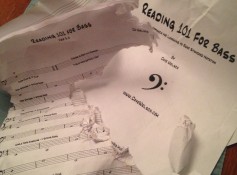An artist comes to your town for a 3 night engagemnent. The only problem is that the Bass Player has the flu, a temperature of 102, and can't keep anything in his stomach for more than 15 minutes. There's no way he can play tonight and possibly not for the rest of the week. The three shows are all sold-out and as they say, "the show must go on."
Music is a Language
That’s a statement that we often see on posters, tote bags, T-shirts, and stickers. Sometimes we hear it from Musicians and Music Educators.
As Students of Music, we must ask ourselves, “Just how deeply to I believe that? And, if it is true, am I approaching my learning about Music as I would approach learning Spanish, German, or any other foreign language?”
When I was younger and attempting to learn French, it dawned on me that people who live in France don’t think in English. To become fluent in a language, one must think in that language without translating it to another. When we talk, we think in our native language. When we play Music, we think in the Music Language, with no translation to our native language.
When we read aloud, we are looking at symbols that represent sounds. The letters used to make up words are merely ink on a page that represent sounds. The individual sounds are combined to create other sounds that have meanings that we have defined.
Symbols and Sounds
B
That's a symbol that we use in the English language. Ink on a page that represents a sound. The sound is “buh”. We label that symbol as a “B” in our alphabet.
This is a symbol that we use in the Music language. Ink on a page that represents a sound. The sound is the pitch that you hear when you place a finger on the second fret on the “A” string on your Bass and pluck the string.When we label this symbol as a “B”, we are translating the symbol to another language; English. That act of that translation slows down the process of decoding them symbol and producing the sound.
Of course there are rules for grammar in the Music language, just as in any other, and conventions for writing in the language. These are akin to learning basic rules of grammar in written language.
It's Much Easier Than You Think
 Recently a came across a TalkBass post about learning to read standard notation. This appeared in amongst the seemingly never ending threads usually titled something like "Should I Learn How to Read Music?". (There are also endless posts about TAB, but we'll leave that for another post here. In the meantime.. DUMP IT.)
Recently a came across a TalkBass post about learning to read standard notation. This appeared in amongst the seemingly never ending threads usually titled something like "Should I Learn How to Read Music?". (There are also endless posts about TAB, but we'll leave that for another post here. In the meantime.. DUMP IT.)
The answer to that question is quite obvious then applied to Music as a Language. Consider how you'd be doing in life if you couldn't read your native tongue. You might be able to survive, but with very limited success and growth.
A major issue here seems to be the notion that learning to read standard notation is hard.
It is not.
I encourage you to continue your journey down the rabbit hole of playing Music by learning to read standard notation. The basics of reading notation can be learned in the time it would take you to figure out a Bass part using TAB. (Reread my comment above.)
There are literally hundreds of resources online to get you started. Some are better than others, but they will all give you a jump start.
Of course, you can contact me for Lessons and guidance.
HAVE FUN!


